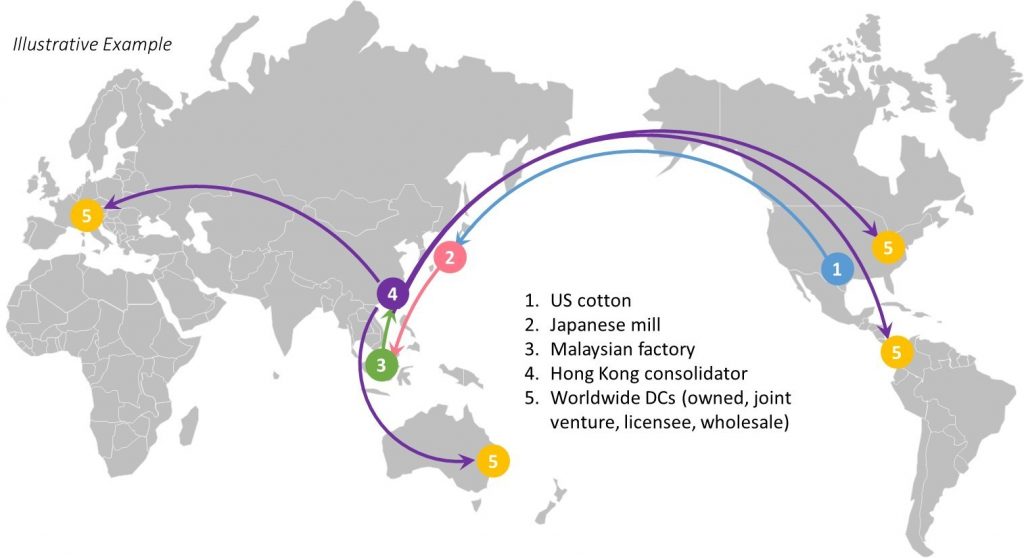Blockchain
Transforming the Global Supply Chain
May 10, 2017 | Written by: Steve Laughlin
Categorized: Blockchain
Share this post:
To save costs and decrease turnaround time, manufacturers typically turn to the supply chain. They break it down so that individual product parts are made in different areas of the world during each stage of production. From the pen in my pocket, to the shirt in which it sits, to the coffee I’m drinking, it’s all the same story – a complex, global supply that’s designed to get products from point A to B, on time and on budget.
 But today’s supply chain must drastically change. The current model of sourcing, manufacturing, and distributing to get products to consumers quickly and efficiently is outdated. And while there is much experimentation going on in the market, there is no alternative model to take its place. In short, the supply chain remains largely segmented and non-digitized.
But today’s supply chain must drastically change. The current model of sourcing, manufacturing, and distributing to get products to consumers quickly and efficiently is outdated. And while there is much experimentation going on in the market, there is no alternative model to take its place. In short, the supply chain remains largely segmented and non-digitized.
How do we move it forward? The key first step starts with understanding consumers’ wants, needs and desires, and then work upstream. Brands must translate the huge amounts of information that exist at the local level into demand signals, and then digitize the entire supply chain to be more flexible and nimble. This will improve speed to market and reduce excess inventory and cost.
New predictive tools and technologies may transform the supply chain. IBM Metro Pulse powered by Watson combines a diverse set of time-sensitive, hyper-local city data at a neighborhood level—such as weather, local events, traffic, or consumer movement—with business data, and then applies cognitive computing so brands can more easily make business decisions, and has been shown to greatly increase MAPE forecast accuracy.
Also the blockchain – which digitizes transactions between parties to create an unalterable record – combined with the Internet of Things (IoT) sensors to track the physical movement of goods, can fundamentally change the way products are managed throughout the supply chain.
This combination provides full visibility across the entire supply chain from product conception all the way to the customers’ hands. As goods move across the ecosystem of suppliers, manufacturers and distributors to store shelves, or B2C distribution centers, and ultimately to consumers, each participant can have secure end-to-end visibility the entire time. This new kind of system can establish a single version of the truth that significantly improves dispute resolution and helps to maintain trust.
An additional benefit is the ability to authenticate raw materials, production methods, and means of distribution. Whether it’s confirming conflict-free diamonds, the use of ethical factories, or temperature-controlled shipping, blockchain can verify the origin, provenance, and authenticity of each step in sourcing, production, and distribution. This protects suppliers, buyers and shippers against theft and counterfeiting, and provides consumers with a higher degree of brand trust.
This is only one exploratory example of how digitizing the global supply chain will create new business models. Over time, technology such as 3D printing may have an even more profound impact.
Regardless of the technology, digitizing the global supply chain is the future of our industry. The digital supply chain will make brands more flexible and nimble so they can integrate customer feedback continuously and increase the overall collaboration between consumers, brands, retailers, manufacturers and design partners.
Still, the most difficult part will be transforming the culture. Brands need to begin changing how they think about the supply chain and adopt a philosophy of experimentation. If they want a continuous flow of innovation to make and keep their customers happy, they must experiment with the creation and design of a new global supply chain model – or risk falling behind those who do.
_____________________________________
Related: IBM Retail Industry Blog – From Supply Chain to Value Ecosystem

General Manager, Global Consumer Industries, IBM
Making the workplace safe for employees living with HIV
The recent promising news about Covid-19 vaccines is in sharp contrast to the absence of a vaccine for HIV, despite decades of research. Unlike Covid-19 with a single viral isolate that shows minimal diversity, HIV circulates in a wide range of strains that so far have proven impervious to a single vaccine. Fortunately, more people […]
Call for Code for Racial Justice Needs You: Join the Movement
IBM has never avoided taking on big challenges. At IBM, we are privileged to drive impact at scale. We take on challenges that transform our clients, impact people’s lives and innovate for future generations as we strive to effect systematic societal change. Over the course of our 109-year history, the evidence has become clear that […]
A New Wave: Transforming Our Understanding of Ocean Health
Humans have been plying the seas throughout history. But it wasn’t until the late 19th century that we began to truly study the ocean itself. An expedition in 1872 to 1876, by the Challenger, a converted Royal Navy gunship, traveled nearly 70,000 nautical miles and catalogued over 4,000 previously unknown species, building the foundations for modern […]


